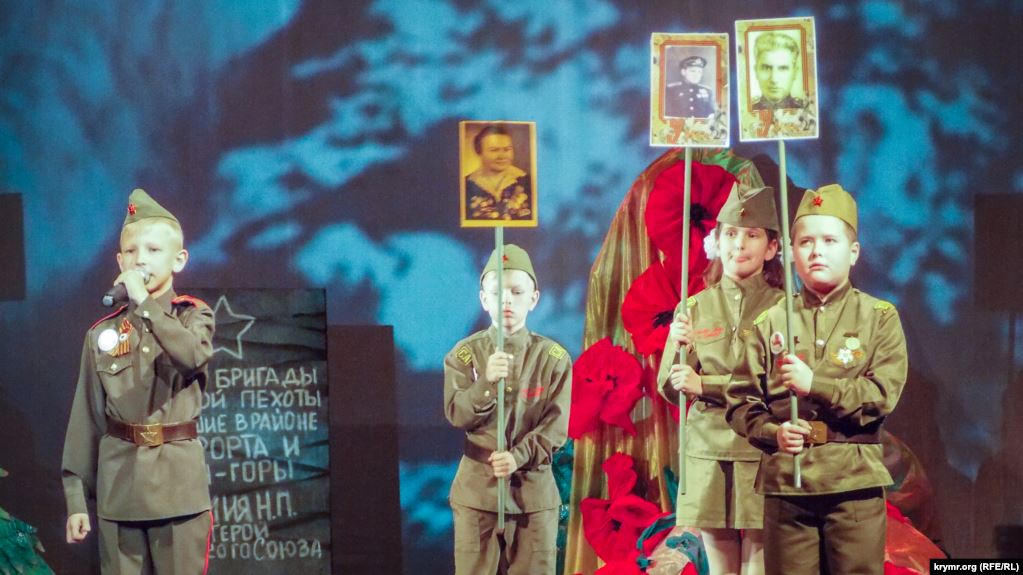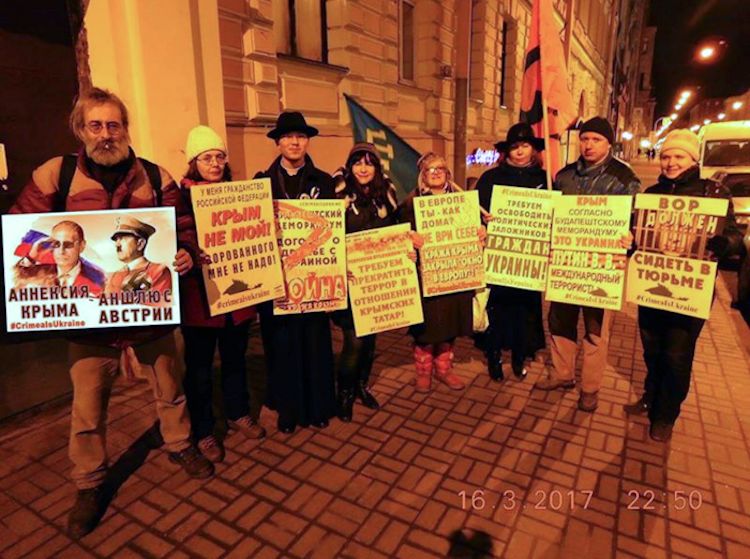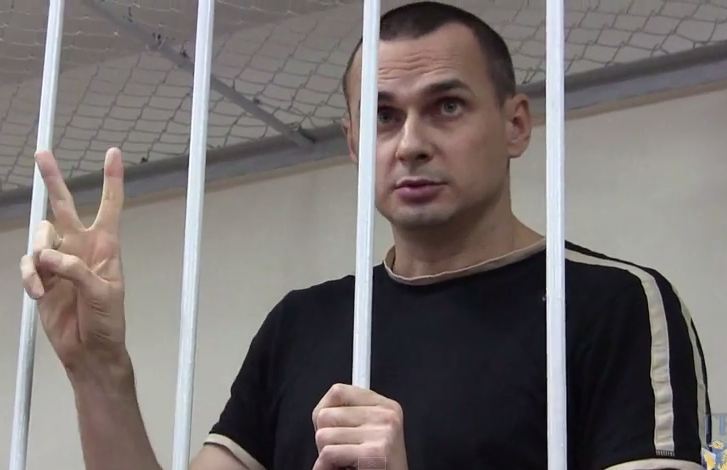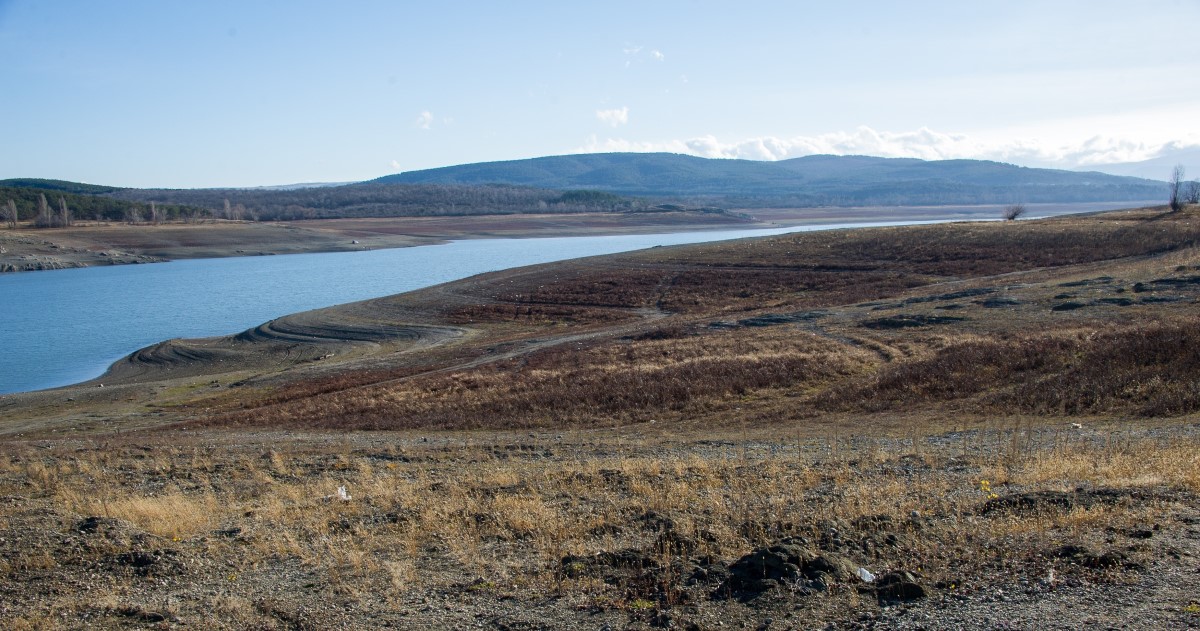The goals of this program are clearly defined: encouraging military service in the Russian army, imposing moral responsibility for the fate of all Russians wherever they be, destroying Ukrainian civic identity and turning Crimean children into patriots and citizens of the Russian Federation.
These goals are clearly outlined in different documents issued by the occupying power. The Crimean educational system has a key role to play in this program. The Russian army, the Volunteer Society for the Promotion of the Army, Aviation and Navy, and different state-owned and public organizations are also involved in this militarization program.
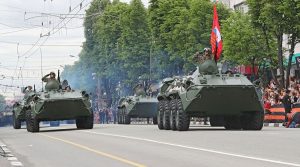
Pandemic no obstacle to propaganda
The COVID-19 pandemic has not halted Putin’s propaganda machine. The ban on holding mass events in Crimea has been in effect since last spring, and a special decree was even issued in August, 2020 by the self-proclaimed “Head of the Republic of Crimea”, Sergei Aksionov. However, military service and activities are actively promoted. Although the number of covid cases increases daily in Crimea, military propaganda continues to pervade Crimean society.
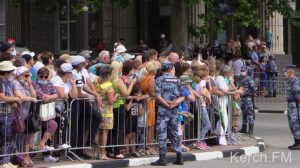
Despite the pandemic, here are some examples of how Russians teach Ukrainian-born Crimean children to be citizens and patriots of Russia:
🔈 On June 24, 2020, the occupying authorities held a military parade of Russian troops and equipment in all the major Crimean cities.
🔈 On July 26, 2020, the occupying powers held a series of public events celebrating the Day of the Russian Navy in Sevastopol.
🔈 The military-technical forum Army-2020 was held in Kerch from August 27 to 29. In the central square of the city, Russian soldiers taught local children how to handle weapons and promoted military service in the Russian Armed Forces.
🔈 The military-technical forum Army-2020 was also held in Sevastopol from August 27 to 29.
Brainwashing under the guise of education
At the beginning of the new school year, on September 1, the Russian government introduced amendments to the Law of the Russian Federation “On Education in the Russian Federation”. Certain phrases were added to the old law, namely that schools should inculcate a sense of patriotism, civic consciousness, respect for the defenders of Motherland Russia and the exploits of the Heroes of the Motherland.
Russian authorities have begun to extend the law to Crimea, overlooking the fact that such actions violate not only the UN Convention on the Rights of the Child, but also a number of other international regulations.
Moreover, such “patriotic” programs are morally wrong with respect to Crimean children as they demean Crimean history, and on top of that, they put the lives and health of Crimean schoolchildren in danger. After all, these school activities are carried out in complete disregard of sanitary norms and regulations that could protect the children from COVID-19.
Military propaganda for children and teens
Many propagandistic military events are held in Crimea. Some of them are carried out in accordance with decrees issued by the Ministry of Defence of the Russian Federation, which mainly encourage military service in the Russian army. But, many other activities are aimed at transforming the children’s civic identity from Ukrainian to Russian.
The website of the so-called “ministry of education” of Crimea shows a plan for instilling patriotism in Crimean children. The names of these events and activities speak for themselves:
- A series of activities labelled “We are Russian citizens!”
- Events dedicated to the anniversary of the birth of Lieutenant General Mikhail Kalashnikov
- Patriotic events celebrating “Conscript’s Day”
- Spartakiads for pre-conscription Cossack youth
- Military sports games called “Victory” and “Cossack Alarm”
- Cossack youth rally “Ready to work and defend!”
The Crimean “ministry of education” is responsible for all these events. It also organizes the participation of Crimean children in other all-Russian propaganda campaigns. According to a well-defined educational program, Crimean officials, teachers, professors and instructors are charged with ensuring that Crimean students take part in such events as:
- Aleksandr Alexandrov Military Patriotic Song Contest (Aleksandrov was a Soviet composer; he composed the State Anthem of the Soviet Union/Russia-Ed)
- Cadet’s Grand Ball “Fatherland’s faithful sons”
- Young Officers’ Ball “For the Glory of Great Rus”
- All-Russian military poster contest “Our Native Army”
- Interregional competitions for the best-prepared pre-conscription citizens, and contests for the best-prepared organization for conscription
- Military sports festivals
- Russian Youth Spartakiad for pre-conscription adolescents
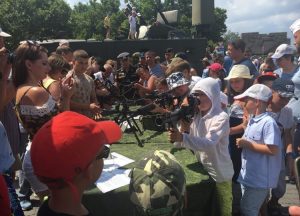
Sevastopol has gone even further. Besides the local education department, other players are included in such actions and events, namely the Black Sea Fleet of the Russian Federation, local branches of the Volunteer Society for the Promotion of the Army, Aviation and Navy, the Yunarmiya and even the Sevastopol Komsomol. Here are some examples of what is organized for children throughout the year:
- Solemn ceremonies admitting students to the ranks of Yunarmiya
- “LeninLives” flash mob
- Celebration of the anniversary of the Lenin Komsomol
- All-Russian historical game “Kalashnikov Quest”
- Events and competitions dedicated to the Day of the Defender of the Motherland, including a month of military and patriotic work
- Youth rally dedicated to the anniversary of the “reunification” of Sevastopol with the Russian Federation
- All-Russian film screening dedicated to the anniversary of the Soviet Army and Navy
- Yunarmiya concerts including military-patriotic and civil-patriotic songs, chants, speeches, etc.
- Solemn farewell of young people to be drafted in the spring into the Russian Army
- Yunarmiya Army Program “School for Future Commanders”
- Information and propaganda campaign “Our job is to protect the Homeland!”
- Annual competition for the best-prepared pre-conscription citizens, and contests for the best-prepared organization for conscription in the city of Sevastopol
- Creation of Cossack classes
In addition, the Sevastopol military commissariat was charged with bringing to the attention of the population a special decree issued by the Commander of the Southern Military District of the Armed Forces of the Russian Federation. The authorities were ordered to assign military units of the Russian army to Sevastopol schools to conduct propaganda campaigns and organize military patronage assistance.
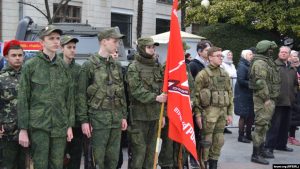
There are also numerous public organizations engaged in such work. For example, the Dzhankoi Centre for Military and Patriotic Education Sivash received funds from the Russian Presidential Fund for the implementation of a propaganda project - “Great Russia for great people. Great in spirit and strong in body.” One of the main tasks of this project is to prepare schoolchildren for service in the ranks of the Armed Forces of the Russian Federation, admission to universities of the Ministry of Defence, the FSB, the Ministry of Internal Affairs, and the Ministry of Emergency Situations.”
Cost of propaganda
Financing for all these propagandistic programs, plans, events, etc. comes from different sources. The Russian Ministry of Defence has its own budget for these purposes. The “ministry of education” of Crimea receives funds from the local budget for activities to educate “citizens of Russia and patriots of Crimea”. From 2016 to 2018, over 43 million rubles were allocated to the Crimean budget for these purposes.
From 2016 to 2019, more than 86 million rubles were spent on such programs. Almost half of the amount was allocated for 2019. The Sevastopol Volunteer Society for the Promotion of the Army, Aviation and Navy will receive 39 million rubles from the government of Sevastopol for 2019 to 2022.
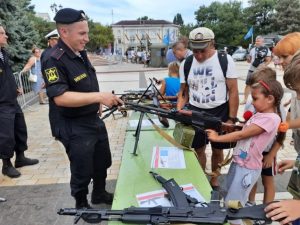
“Social activists”-propagandists receive money directly from Russian President Putin through a presidential grant. For example, in 2018, the Dzhankoi Centre Sivash received a grant of 993,799 rubles.
In 2018, Putin gave the Sevastopol organization Military-Patriotic Youth of Good Will a grant of 1,288,555 rubles to “motivate children and adolescents to serve in the Russian Army, and strengthen their sense of belonging to the great history and culture of Russia”. In 2019, this organization received another 1,885,555 rubles in presidential grants to prepare children and adolescents from Yalta for service in the Russian Armed Forces.
Even more money is spent on brainwashing Crimean children and adolescents. In order to form young Crimean patriots and citizens of Russia, 29 million rubles were allocated to the budget of Crimea for 2015-2017. Another 800,000 rubles were allocated for the creation of a Regional Centre for the Preparation of Citizens for Military Service and Military-Patriotic Education. To top it all off, from 2020 to 2024, the occupying powers plan to spend half a billion rubles on the patriotic and spiritual education of Crimean children and adolescents.
What can Ukraine do?
In order to halt these violations of children’s rights in Crimea, Ukrainian politicians and leaders, civil society, international bodies and organizations, and foreign governments should work together and coordinate their actions and strategies.

The more pressure on the Russian Federation, the more chances Ukraine and the international community have to save Crimean children from the influence of Russia’s propaganda and militarization campaigns. Human rights activists, who have been systematically studying the issue for six years, suggest the following steps:
- Regular monitoring of children’s rights in Crimea
- Advocating for the access of international monitoring missions to Crimea
- More effective violation investigations by Ukrainian law enforcement agencies
- Systematic collection of evidence of violations
- Preparation of thematic reports to the International Criminal Court and the UN Committee on the Protection of the Rights of the Child
- Informing Crimean residents about the situation in Ukraine, independent of the Ukrainian government
- Improving opportunities for the education of Crimean children and youth in government-controlled territories of Ukraine
- Providing Crimean residents with access to independent Ukrainian and foreign media
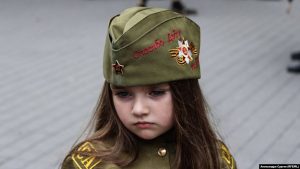
The main point is to refrain from blaming each other for what is happening. Each citizen can make a significant contribution to resolving the problem. The most important thing is not to give up, but to continue pushing forward. War can take on multiple forms, but children will always be children, and it is Ukraine’s duty to protect them.

